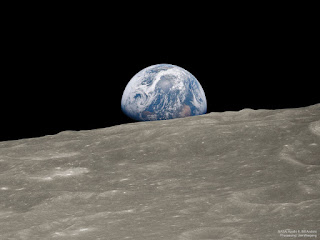 |
| ‘Earthrise’, from 50 years ago, is one of the most influential images from the Apollo space program |
Posted by Keith Tidman
Humankind’s curiosity about the universe, and yearning to explore its vastness, has been insatiable …
- Early hominids staring inquisitively at patterns in the dotted night sky
- Copernicus contemplating the heavens through his telescope, and our place in space
- The iconic landing of humans on the craggy moon surface
- Twin Viking vehicles sending back vast troves of information as they traverse interplanetary and interstellar space
- The Hubble space-based telescope capturing images of the farthest reaches of the universe, revealing the early moments of creation
- The detection of habitable planets outside our solar system, inspiring what-ifs as to life there
- The International Space Station-cum-science lab perched in geostationary space
- A hive of international satellites performing jobs essential to modern society’s thriving
- The Perseverance rover alighting on Mars to search for signs of ancient extraterrestrial life
Our minds — the font of our imagination, inquisitiveness, dreams, and seductive desire for knowledge and understanding — have been enthusiastic spacefarers. Machines, tasked as our proxies, have had their turn to perform these missions; on other occasions, human pioneers have intrepidly taken to space. Paradoxically, these endeavours have not shrunk the universe, but have made it seem all the bigger. They have allowed us to marvel at a universe both harmonious and violent at the same time.
Might the kinds of human-centric and machine-centric endeavours listed above continue to define our longer-range destiny, in still grander and unforeseen ways? Should they?
The hazards posed by some of these missions have been presented as reasons not to engage in them. Space is a hostile place for humans. Yet, with pioneers’ minds open to the reality of inevitable unknowns, there have always been unanticipated risks associated with human exploratory enterprises over the millennia, whether navigating vast roiling oceans or trekking across unfamiliar, harsh landmasses. The current and future probing of space will be no exception to this historical course.
The fatal explosion of two space shuttles, one upon launch and the other upon reentry, with astronauts aboard accentuated the potential perils. Cosmonauts have faced similar fates. The poignancy of the price in human lives and health is not lost on us: The motivation of space exploration, discovery, and learning has always entailed a linking of emotion and reason, with acceptance of the possible consequences like these sobering mishaps.
One of the more menacing hazards during human missions beyond the Earth’s protective magnet field is radiation, with its deleterious effects on the central nervous system, as well as on cognitive and motor functions. Also, experiments with one twin on Earth and the other on a lengthy stay in space have revealed the problematic alteration of cells and genes. And astronauts’ transition from one gravity field to another has raised a need to examine re-adaptation by the body’s systems. We’re vulnerable, to be sure.
Yet, these and other hazards won’t hamper humanity’s spirit; these perils, too, will be overcome with time and ingenuity and determination. For the foreseeable future, there will remain an interdependent relationship between the best of machine learning, automation, and resilience and the best of human original thinking, hypothesising, interpretation, extrapolation, and dexterity in pivoting to respond to the unexpected.
Robots and human should be regarded as complementary allies in space exploration, not an either-or proposition. Neither will fully replace the other; nor ought they.
Meanwhile, taking to space for field studies has resulted in a growing cache of scientific and technological spin-offs on Earth. On a practical front, there are myriad and diverse scientific and technological derivatives that enter our everyday lives as consumers, as well as farther-reaching breakthroughs.
These breakthroughs include advances across broad domains: medicine, transportation, communication, food production, water purification, robotics, computing, human physiology, safety, recycling, energy, meteorology, engineering, materials science, and the environment. To those exhaustive extents, among others, investments in space exploration support homebound developments on sundry levels.
As for the budgetary politics of space exploration, and whether they ought to out-place competitive needs at home, one might wonder whether the monumental sums spent on bristling arsenals to fight wars evermore lethally are, in fact, a wiser commitment of capital than is exploring space. Not lost in this particular illustration is the arresting irony in more and more nations believing it an imperative to competitively militarise space.
All that said, when it comes to our spacefaring ambitions, there are, I propose, variables of a more intrinsic nature: like enlightening our thinking about humanity, community, and our deepest values and ideals.
To these points, theoretical science and pure research have indispensable roles. History brims with examples of what humankind learned — where knowledge and understanding had inherent value in their own right — even if tangible offshoots were years, if ever, in the making and years, if ever, in the full-fledged adoption. An intrinsic value that derives from the persistent evolution of basic science, as well as the riches in new knowledge drawn from irresistibly ploughing untilled ground.
Theoretical science and pure research, even though where they might eventually lead is uncertain, commonly sharpen the cutting edge of human imagination, vision, and inspiration. That’s progress, of a critical sort. Being consumed by short-term thinking, with its emphasis on immediate payback, deprives us of our intellectual seed stock: the foundation for converting hypotheses into interesting and revealing models of our reality, both scientific and philosophical.
Space, then, is not the ‘final frontier’, but rather is only the ‘next frontier’.
Earth is more than the ‘mote of dust’ of Carl Sagan’s imagination. Humanity, I anticipate, will tirelessly play out these spacefaring beginnings, to make its destiny reality.